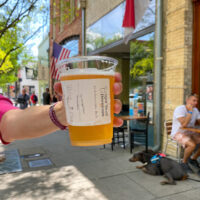The boom in bourbon has been a boon to Kentucky economically, but now rural residents in a swath of the western Bluegrass region are fighting the warehouses that turn whiskey into bourbon. They object to the fungus that is fed by the aging alcohol escaping into the air from barrels in the warehouses, worry about the storage of so much flammable material, and dislike what they call an industrial invasion of bucolic landscapes.
Residents of Henry, Franklin and Anderson counties point to the black fungus that is obvious on signs, homes and other surfaces. Distillers pooh-pooh those concerns, citing studies that show the fungus is harmless, but they acknowledge it’s unsightly. And the concerns are more than cosmetic.
“What I fear is this will be a continuation of an old Kentucky story, in which outsiders come in, take as nearly as they can what they can, what they want, and give as little back as they possibly can,” farmer-author-poet-activist Wendell Berry, 88, told Janet Patton of the Lexington Herald-Leader.
“The bulldozers will be there before anybody else to give the land a new shape that it’ll never get over, not in human times,” he said.
Near the farm where Berry grew up, Angel’s Envy has won Henry County Planning Commission approval to turn a 1,200-acre cattle farm into a “bourbon campus” with up to 25 warehouses, lodging, an amphitheater, a visitors center, a helicopter pad and more.
“We are being asked to sacrifice this land to tourism and whiskey,” Berry told the commission last month. The commission voted 6-3 for the zone change; the final decision is up to the county’s legislative body, the Fiscal Court, on Sept. 20.
One the other side of the argument is “Connie Blackwell, a Lawrenceburg real estate agent who lives in Tyrone in the valley below the Wild Turkey distillery,” Patton reports, quoting her about the fungus: “It is a mess; you do have to pressure-wash your house once a year. You get used to it. Everybody down here in Tyrone tolerates it. It’s just no big deal … for the taxes they bring into our county, it’s worth it, to me. … I don’t believe the whiskey fungus hurts us. Honest to god, for the amount of taxes … it really is a fair exchange.”
But Patton notes that distillers are lobbying for the local tax on aging whiskey to be reduced, which would be the latest in a series of tax breaks that have helped fuel the boom.
The Rural Blog is a publication of the Institute for Rural Journalism and Community Issues based at the University of Kentucky.






